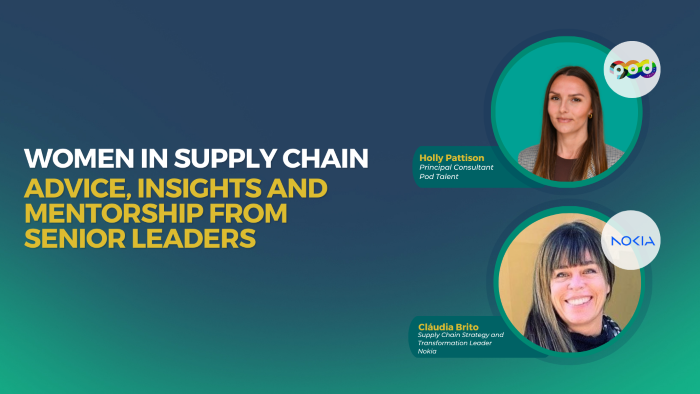Claudia Villa Lobos de Brito is a highly experienced supply chain and operations leader currently at Nokia. With a career spanning global transportation operations, distribution network design, and strategic supply chain transformation across multiple industries, Claudia brings a wealth of expertise in driving efficiency, sustainability, and innovation. Her career journey and insights into the evolving role of women in supply chain make for a really interesting read.
What inspired you to pursue a career in Supply Chain?
I started my career in P&G taking on an internship in Supply Chain, straight from university, after graduating as a Chemical Engineer. It was meant to be a temporary experience, quite analytical, setting up a new tool for supply planning. However, at the end of the 4 months, I was offered a permanent job. It seemed natural to keep working in an exciting environment, interacting with people from all over the world and learning continuously by solving problems on the job. So, in reality, I didn’t choose Supply Chain as a career, it chose me.
What advice would you give to young women who are considering a career in supply chain?
A career in supply chain requires that you get equally energised by jumping into action, delivering the business in the short-term, often under pressure, and taking a longer-term view by planning ahead, designing quality processes that bring efficiency and serve the customers with excellence. All this done while continuously engaging with all types of people, from top management to warehouse floor operators. If this is for you, go for it!
Where do you see the industry going in the next five years, and what role do women play in that evolution?
Supply Chain professionals deal with the physical, information and financial flows. This will not change, however the industry will deeply transform in the near future because all flows will be impacted by AI. There will be work done with nearly no human intervention (eg basic customer service), and other work where humans want to partner with AI (eg strategic decision making). In all cases, value creation in this new environment will require critical thinking, collaboration and strong ethics, and women are well positioned to lead in these areas.
What kind of support or mentorship has made a difference for you?
The most satisfying moments in my career happened when I had bosses that gave me great responsibility, trust, and the opportunity to learn. In turning points of my career, I would ask for advice from them (sometimes many years after we’ve worked together) because I knew they would give me honest input, knowing my strengths and development areas.
Have you noticed a shift in how companies support women in supply chain? What still needs to change
In many great companies that I’ve worked in, there are programs to support women advance their careers in supply chain. This is needed because it’s been a male dominant industry, namely in manufacturing (at management level), distribution and transportation. What is needed is more women role-models sharing their inspirational career stories, awareness that visibility is key (it’s not enough to do a good job, you also need to be known by those who can help your career), career planning (think of where you want to be in the future and find assignments to help you get there) and, finally, networking for sharing knowledge and support.
What barriers, if any, have you faced as a woman in this industry – and how did you push through them?
I’ve always worked in companies that promote gender diversity, and don’t create barriers for women. Also my family never made me feel I couldn’t do something because I was a woman, and I live in a country where women and men have equal rights (and duties). I was lucky enough not to have faced many barriers in life because of my gender.
What do you think companies could do to attract and retain more women in supply chain roles?
To attract women into supply chain, it is important to remove gender bias in recruitment and train women in writing CV’s, applying (don’t need to tick all the boxes in the job description) and being interviewed. Retaining requires securing a healthy and safe business environment, with meaningful human connections, which is good for everyone frankly.
Are there unique strengths that women bring to supply chain roles that often go under-recognised?
Women tend to be more sensitive to people’s feelings, better listeners, and more collaborative, making sure everybody’s heard. This lends to psychological safety, which is key for teams to be effective.
What does true inclusion look like to you? Not just diversity – but inclusion?
Inclusion goes indeed beyond diversity, because it’s about making people feel that they belong, regardless of their background (that might be similar, by the way).
Are there any networks or communities that have supported you as a woman in supply chain? (And would you recommend them?)
There are many great women communities that I’ve been tempted to join, because the people participating in them were so amazing, passionate and full of ideas, but it never happened. I’ve however mentored young women, the most recent last year in a Management School program, and it was very rewarding.

